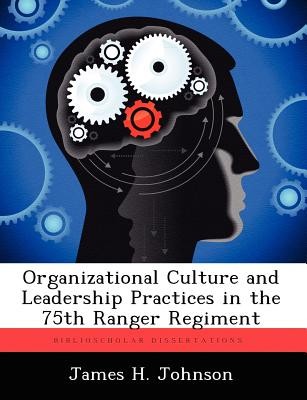
- We will send in 10–14 business days.
- Author: James H Johnson
- Publisher: BiblioScholar
- ISBN-10: 124928399X
- ISBN-13: 9781249283997
- Format: 18.9 x 24.6 x 0.8 cm, softcover
- Language: English
- SAVE -10% with code: EXTRA
Organizational Culture and Leadership Practices in the 75th Ranger Regiment (e-book) (used book) | bookbook.eu
Reviews
Description
This study examines what effect unit culture has on leadership practices in the 75th Ranger Regiment. The study investigates how the unit culture of the 75th Ranger Regiment developed. Through a survey questionnaire administered to selected leaders in the 75th Ranger Regiment, it explores prevailing views on the effect unit culture has on leadership practices. Data from the study suggests three conclusions. First, executive leaders are more likely than mid-level leaders to delegate actions to lower levels of the unit. Secondly, mid-level leaders are likely to identify and eliminate soldiers who can not meet established standards. Finally, mid-level leaders are likely to risk new methods to achieve mission accomplishment. These leadership practices demonstrate characteristics of an adaptive or learning organization. First, leaders are willing to decentralize control in order to increase motivation and initiative. Second, leaders feel a sense of personal mastery that drives them to uphold shared values. Finally, leaders are not risk-averse and believe in being proactive problem solvers. This study recommends that the 75th Ranger Regiment should execute an aggressive junior-leader-training program. Second, the 75th Ranger Regiment should allow sufficient time for junior leaders to conduct subordinate level training. Finally, all levels of leaders in the unit should be involved in the long-term policy development process.
EXTRA 10 % discount with code: EXTRA
The promotion ends in 19d.06:10:14
The discount code is valid when purchasing from 10 €. Discounts do not stack.
- Author: James H Johnson
- Publisher: BiblioScholar
- ISBN-10: 124928399X
- ISBN-13: 9781249283997
- Format: 18.9 x 24.6 x 0.8 cm, softcover
- Language: English English
This study examines what effect unit culture has on leadership practices in the 75th Ranger Regiment. The study investigates how the unit culture of the 75th Ranger Regiment developed. Through a survey questionnaire administered to selected leaders in the 75th Ranger Regiment, it explores prevailing views on the effect unit culture has on leadership practices. Data from the study suggests three conclusions. First, executive leaders are more likely than mid-level leaders to delegate actions to lower levels of the unit. Secondly, mid-level leaders are likely to identify and eliminate soldiers who can not meet established standards. Finally, mid-level leaders are likely to risk new methods to achieve mission accomplishment. These leadership practices demonstrate characteristics of an adaptive or learning organization. First, leaders are willing to decentralize control in order to increase motivation and initiative. Second, leaders feel a sense of personal mastery that drives them to uphold shared values. Finally, leaders are not risk-averse and believe in being proactive problem solvers. This study recommends that the 75th Ranger Regiment should execute an aggressive junior-leader-training program. Second, the 75th Ranger Regiment should allow sufficient time for junior leaders to conduct subordinate level training. Finally, all levels of leaders in the unit should be involved in the long-term policy development process.


Reviews